TODAY’S READING FROM THE OLD TESTAMENT- ISAIAH 1:1-2:22
The Hebrew Old Testament Scriptures are referred to as “The Tanakh” (sometimes spelled, Tanach). The name is a composite term made up of the leading consonants of the three major sections of their Bible, which would have been the Bible Jesus and the early church used. The three sections are the Torah (the five books of Moses, also known as the Law, or the Pentateuch, the Nevi’im (the Prophets) and the Ketuvim (the Writings).
Today we start reading the Nevi’im, the Prophets. This section is divided into two sections: The Major Prophets and the Minor Prophets. They are named not because some prophets had more importance than others. The descriptive term, ‘Major’ does not refer to their superiority but the size of their scrolls. The Major Prophets are significantly larger. Isaiah is divided into 66 chapters. Jeremiah has 52 chapters, plus an extra 5 in Lamentations. Ezekiel has 48. (The Book of Daniel is not included with the Prophets in the Hebrew Bible. It is included in the Ketuvim, the Writings, in the Tanakh.) The prophecies of the remaining 12 prophets from Hosea to Malachi are much shorter books, and therefore they are called ‘The Minor Prophets’.
The Book of Isaiah is considered a ‘mini-Bible’ for many reasons. Isaiah has 66 chapters. The Bible has 66 books. The Book of Isaiah has two major sections, with an historical hinge (Chapters 36-39). The first section of Isaiah (including the historical hinge) has 39 chapters with an emphasis on the Law and the Righteous Government of God. The Old Testament of the Bible has 39 books with the same emphasis. The second section of Isaiah has 27 chapters (Chapters 40-66) with an emphasis on Grace, Salvation and the Future Reign of Christ and the New Heavens and New Earth. The New Testament has 27 books with the same emphasis.
The New Testament alludes to the Book of Isaiah approximately 250 times and quotes it explicitly at least 50 times.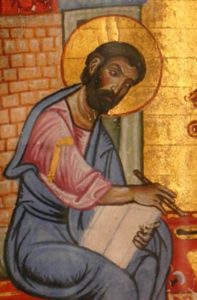
Isaiah has been called ‘the fifth evangelist’. And the book has sometimes been referred to as ‘the fifth gospel’, because Christ is featured so predominantly. Christ’s virgin birth, His sinless life, His attesting miracles, His substitutionary death, His resurrection, His second coming and His future reign are clearly presented.
Isaiah probably began his ministry several years before Uzziah’s death (740 BC). He continues to prophesy during the reigns of at least 4 kings (Uzziah, Jotham, Ahaz and Hezekiah). Tradition is that he was sawn asunder during the reign of evil King Manasseh.
Isaiah means, “Salvation, or deliverance, of the Lord”. He prophesies of 5 deliverances: 1. The deliverance of Judah from Assyrian invasion (Chapters 36-37); 2. the deliverance of the nation from the Babylonian captivity (Chapter 40); 3. the future deliverance of the Jews from their dispersion among the Gentiles (Chapters 11-12); 4. the deliverance of sinners from judgment and 5. The final deliverance of creation from the bondage of sin in the new heavens and new earth (Isaiah 66:17f).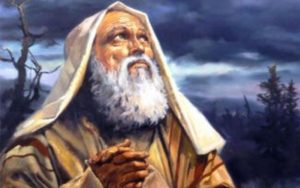
The predictive elements of Isaiah’s prophecies are remarkable. His accurate predictions of the Babylonian exile and his naming of the Achaemenid ruler, Cyrus, who would issue the decree permitting the Jews to return to Israel and the subsequent post-exilic period, prompted modern skeptics to believe there must be two or three Isaiahs, writing at different times! They note that the tone of the second section, the last 27 books, must indicate another Isaiah.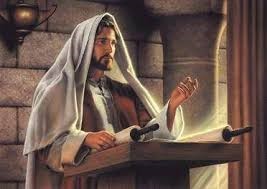
Yet Luke affirms the single authorship of the scroll of Isaiah (in Luke 4:17-19) when Jesus opens the scroll and reads from Isaiah 61:1-2 in the second section. He ascribes the passage to Isaiah, rather than an unknown poet of the Maccabean period or later.
Luke 4:17-19 17 And the book of the prophet Isaiah was handed to Him. And He opened the book and found the place where it was written, 18 “THE SPIRIT OF THE LORD IS UPON ME, BECAUSE HE ANOINTED ME TO PREACH THE GOSPEL TO THE POOR. HE HAS SENT ME TO PROCLAIM RELEASE TO THE CAPTIVES, AND RECOVERY OF SIGHT TO THE BLIND, TO SET FREE THOSE WHO ARE OPPRESSED, 19 TO PROCLAIM THE FAVORABLE YEAR OF THE LORD.”
The scroll of Isaiah is the most intact of all the manuscripts among the Dead Sea Scrolls, dating from 125 B.C. and contain all 66 chapters. There is no substantive manuscript evidence to support more than one author.
Chapter1 verse 1 introduces the scroll’s author and focus.
Isaiah 1:1 1 The vision of Isaiah the son of Amoz concerning Judah and Jerusalem, which he saw during the reigns of Uzziah, Jotham, Ahaz and Hezekiah, kings of Judah.
Chapter 1 of Isaiah has a similar theme to Psalm 50, which we read a few days ago. In poetic language God summons His creation (the heavens and the earth; Isaiah 1:2; Psalm 50:1) to bear witness against His people, proving their disobedience, while also extending mercy to a faithful remnant.
It is also similar to Deuteronomy 32.
Deuteronomy 32:1 1 “Give ear, O heavens, and let me speak; And let the earth hear the words of my mouth.
God is calling His people into the courtroom to prove their disobedience. This chapter also proves human depravity, and yet, the offer of forgiveness and deliverance through faith in Messiah.
Oxen and donkeys are known for special intelligence, and yet they have enough sense to recognize the hand that feeds them and the One who owns them. Not so with these people, who like sheep have turned astray (See Isaiah 53:6).
Isaiah 1:3 3 “An ox knows its owner, and a donkey its master’s manger, But Israel does not know, my people do not understand.”
This is the diagnosis:
Isaiah 1:5b-6 5 whole head is sick and the whole heart is faint. 6 From the sole of the foot even to the head There is nothing sound in it, only bruises, welts and raw wounds, Not pressed out or bandaged, nor softened with oil.
The consequence of sin is widely felt. We see a pattern that is often repeated in human history. 1. Apostacy- People abandon faith in the Word of God, their Creator; 2. Moral awfulness (v.4) and then political anarchy.
Isaiah had access to the kings of Judah and the leaders in the royal court. God has had enough of their hypocrisy. They go through the motions, pretending to be devout with their religious observances, but their hearts are far from faithfulness to God’s Word. He calls God’s people to repentance, warning them of judgment and urging them to take God’s offer of mercy: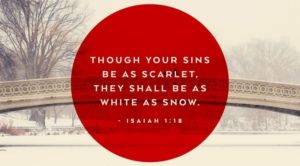
Isaiah 1:18 18 “Come now, and let us reason together,” Says the LORD, “Though your sins are as scarlet, They will be as white as snow; Though they are red like crimson, They will be like wool.
He clarifies what deep repentance looks like:
Isaiah 1:16-17 16 “Wash yourselves, make yourselves clean; Remove the evil of your deeds from My sight. Cease to do evil, 17 Learn to do good; Seek justice, Reprove the ruthless, Defend the orphan, Plead for the widow.
Whereas He predicts blessing if they repent, he warns that judgement awaits, if they fail to do so. The judgment would mean their being “devoured by the sword”, where they would be conquered by their enemies (Isaiah 1:20).
God is urging the people of Judah to return to Him. He reminds them that their future destiny depends upon their response to His forgiving grace.
Isaiah 1:26 26 “Then I will restore your judges as at the first, and your counselors as at the beginning; After that you will be called the city of righteousness, A faithful city.”
Yet those who continue in their foolish rebellion there is consistent warning.
Isaiah 1:28 28 But transgressors and sinners will be crushed together, and those who forsake the LORD will come to an end.
Chapters 2 through 5 constitute one complete prophecy:
Isaiah 2:1 1 The word which Isaiah the son of Amoz saw concerning Judah and Jerusalem.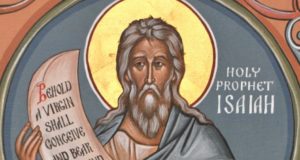
Chapters 2-5 deal with events that have not yet come to pass. We will see as we read the prophets, that there are local prophecies that come to pass in the lifetimes of the hearers. The fulfillment of these prophecies establishes the credentials of these men as prophets of God. As accredited prophets, they make long-range prophecies that we can confidently believe will be fulfilled with the same pinpoint accuracy as the short-range local prophecies.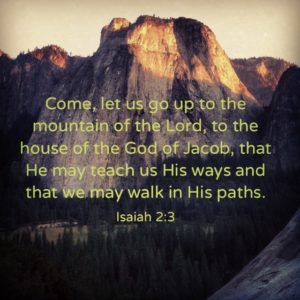
Eschatology is the study of last things. The prophets highlight that history is directional. One day the kingdom of God will be established.
In Isaiah’s poetic language, mountains speak of government.
Isaiah 2:2-3 2 Now it will come about that In the last days The mountain of the house of the LORD Will be established as the chief of the mountains, And will be raised above the hills; And all the nations will stream to it. 3 And many peoples will come and say, “Come, let us go up to the mountain of the LORD, To the house of the God of Jacob; That He may teach us concerning His ways And that we may walk in His paths.” For the law will go forth from Zion and the word of the LORD from Jerusalem.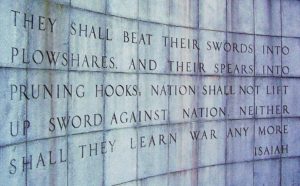
A fragment of the next verses is etched into a wall of the United Nations building in New York. “They shall beat their swords into plowshares, and their spears into pruning hooks. Nation shall not lift up sword against nation. Neither shall they learn war any more.”
The United Nations have failed to achieve this ideal. Notice that they omit the key factor for achieving the peaceable kingdom. Christ.
Isaiah 2:4 4 And He will judge between the nations, and (He)will render decisions for many peoples.
A chief reason for the downfall of Judah will be its accommodation of the idolatries, immoralities and rebellious spirits of foreign nations.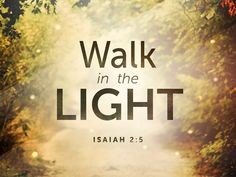
The prophet predicts that the coming kingdom will not come without the cleansing of evil through the judgment on sin. There must be “a day of reckoning” (2:12). Isaiah uses imagery that will be picked up in the New Testament, of people hiding in the rocks when severe judgment falls (2:10, 19).
Isaiah 2:10-11 10 Enter the rock and hide in the dust from the terror of the LORD and from the splendor of His majesty. 11 The proud look of man will be abased and the loftiness of man will be humbled, And the LORD alone will be exalted in that day.
Verse 22 is a rebuke to humanism, regarding man, rather than the Word of God, as the measure of all things.
Isaiah 2:22 22 Stop regarding man, whose breath of life is in his nostrils; For why should he be esteemed?
TODAY’S READING FROM THE NEW TESTAMENT – 2 CORINTHIANS 10:1-18
Paul had his share of critics. They accused him of being bold in his letters, and soft and meek in his personal interactions. His defense is that he intends to be true to the Word and character of Christ which can be both meek, gentle, courageously bold and convicting.
His confidence as a minister of the gospel is not in his own powers of persuasion, his own wisdom and strength, but the powerful ministry of the Word of God.
“The weapons of our warfare are not of the flesh.”
Jesus clarifies this truth:
John 6:63 63 “It is the Spirit who gives life; the flesh profits nothing; the words that I have spoken to you are spirit and are life.
Paul describes his ministry through the means of the preached Word:
2 Corinthians 10:5-6 5 We are destroying speculations and every lofty thing raised up against the knowledge of God, and we are taking every thought captive to the obedience of Christ, 6 and we are ready to punish all disobedience, whenever your obedience is complete.
The Word is a 2-edged sword (Hebrews 4:12) that convicts of sin, punishing disobedience while bringing to life fresh obedience in the heart of the believer by the power of the Spirit.
Paul often finds himself in the awkward position of having to defend himself before his detractors. He is confident in his calling and in the means by which he is fulfilling that calling. He is secure in the knowledge that he is operating within the proper sphere of His God-given authority and spiritual competence.
Paul, while affirming his apostleship is not a ‘lone-ranger’. He recognizes and values the ministries of others and sees how their spheres of authority and ministry complement his (2 Corinthians 10:16-18).
TODAY’S READING FROM THE BOOK OF PSALMS – PSALM 52:1-9
David has been betrayed by Doeg the Edomite. Edomites were descendants of Esau, enemies of Jacob. Doeg was one of the sycophants who catered to the whims of King Saul to gain power and wealth. When David is fleeing from Saul, he found temporal refuge with the household of Ahimelech. With evil intent, Doeg reports David’s whereabouts to Saul.
David expresses his anger in this Psalm. He complains about his enemies. He could be referring to either Doeg or King Saul, and refers to his enemy as “O mighty man” or “O big shot”. Implied: “Who do you think you are?”
David’s description of his enemy could also describe our own sin nature:
Psalm 52:3-4 3 You love evil more than good, Falsehood more than speaking what is right. Selah. 4 You love all words that devour, O deceitful tongue.
But God will bring judgement on the enemy. This is a picture of the work of the cross that terminates the rule of the old sin nature (the flesh).
Psalm 52:5 5 But God will break you down forever; He will snatch you up and tear you away from your tent, and uproot you from the land of the living. Selah.
In contrast to “the man who would not make God his refuge” (52:7), David describes his inheritance in the Lord. He is like “a green olive tree in the house of the Lord” (52:8).
Psalm 52:9 9 I will give You thanks forever, because You have done it, And I will wait on Your name, for it is good, in the presence of Your godly ones.
TODAY’S READING FROM THE BOOK OF PROVERBS- PROVERBS 22:26-27
Proverbs 22:26-27 26 Do not be among those who give pledges, among those who become guarantors for debts. 27 If you have nothing with which to pay, why should he take your bed from under you?
Don’t become a slave to debt or a sucker to loan sharks.
PRAY FOR THE NATIONS – MOZAMBIQUE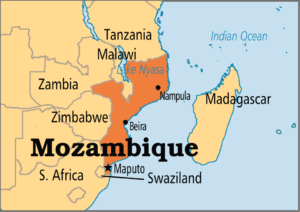
Known as the “Land of Smiles,” Mozambique is located on the southeastern coast of Africa. Stunning beaches, turquoise water, and well-preserved corals line the coastline, adding to this nation’s exotic and undeveloped beauty. It is believed that roughly 40% of the world’s unmined rubies can be found here. In fact, the Montepuez ruby mine is the largest in the world. Yet despite these rich natural resources, Mozambique remains one of Africa’s poorest countries.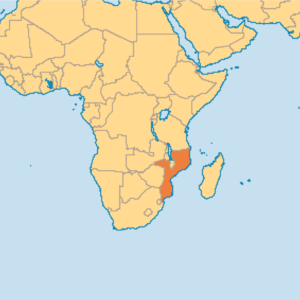
After gaining independence from Portugal in 1975, Mozambique suffered through a sixteen-year civil war that shattered the economy and claimed millions of lives. Recovery has been slow and difficult. An estimated 65% live in poverty, and 21% are unemployed. Approximately 81% of the population is agrarian, using the crops and animals they raise to feed themselves and their families. In addition, an estimated 1.8 million people are plagued with HIV/AIDS, the cause of thousands of deaths each year. Many children suffer from chronic malnutrition, and malaria is responsible for about 35% of children’s deaths. Today this nation is yet again being torn apart by violence between the government and the Mozambican National Resistance (RENAMO), a group that formed in 1976 and has representation within the government. Violent clashes between RENAMO and the government have caused the deaths of thousands and are responsible for over a million refugees. They have signed two unsuccessful peace treaties, one in 1992 and another in 2014. Violence continues despite the peace treaties and the 2014 elections brought further upheaval and instability.
Mozambique is about 46% Christian, 32% Ethnoreligious, and 18% Muslim. Though 11 million claim Christianity, 3 million are Evangelical, representing the fastest growing religious group in the nation! Missionaries are able to receive visas into the country and are able to minister without fear of the government. Years of suffering has led many Mozambicans to seek spiritual answers, and many churches have been planted! Yet there remains a great need for training and discipleship, particularly among the pastors and leaders of these newly planted churches.
PRAYER: Father, we thank You for the prophets and for their portrayal of the Person and Work of Your Son, Jesus Christ our Lord. We acknowledge that we are sinners who desperately need the mercy that was shown to us at Calvary. How assuring it is to know that our sins, as blatantly obvious as a crimson stain, You have erased! We rejoice knowing that our record of wrong has been erased and made as white as snow. Fill us with Your Holy Spirit and enable us to function boldly in the sphere of authority and competency that You have given us. In Jesus’ Name. Amen.
